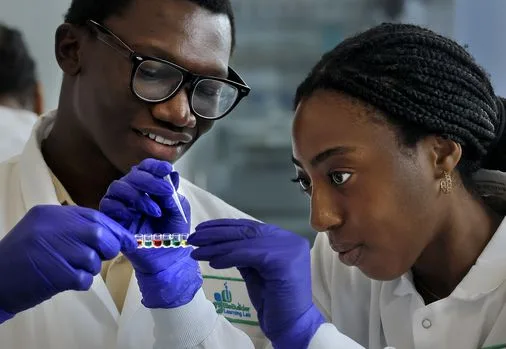
After moving from Nigeria to Mississippi, Rita Osi struggled to adjust to a new country and culture along with the demands of a challenging major — computer science. She barely spoke to anyone. She received little guidance about pursuing a career or the opportunities available to her. She felt lost and alone.
No longer. Osi, a rising sophomore at Jackson State University, last week joined 10 other students in Boston for a fellowship that aims to support Black students pursuing studies in STEM fields — science, technology, engineering, and math. Here, she not only found community and camaraderie with people facing similar challenges, but also guidance, insight, and advice from professionals who have overcome such challenges.
“We need to hear from the people who have done this before and have actually succeeded,” Osi said. “[They] are going to be giving us these opportunities that will help us [become] the great people we know we are.”
The Cultivate Fellowship is an effort by Ginkgo Bioworks, a Boston biotechnology firm, to help close the racial gap in science and technology by encouraging more Black students to enter and stay in STEM fields. About 40 percent of Black college students switch out of STEM majors, compared to 29 percent of white students, according to a 2019 study by Educational Researcher, an academic journal. Fewer than one in 10 STEM workers identify as Black or African American, according to the National Science Foundation.
Other companies have programs to help Black STEM students, but these efforts tend to be aimed primarily at filling companies’ talent pipelines. Ginkgo is different. The company doesn’t use its Cultivate Fellowship for recruiting. Instead, it tries to expose students to a range of opportunities available in STEM — even beyond biotech.
“It’s no lie that underrepresented groups get heavily filtered out of STEM,” Joanna Menendie, a Cultivate fellow from the University of Illinois studying biology and animal science in hopes of becoming a veterinarian. “There’s not always the specialized, more focused resources needed [by] those students, so fellowships and programs like this really help us. They really want to push us to graduate, and that’s everything.”
Increasing diversity in STEM fields is important not only for companies, but also for the broader society and economy. Companies, which have long sought to expand talent pools and ease chronic shortages of scientific and technical occupations, are likely to need even more workers; the Labor Department projects that jobs in STEM-related fields will grow by another 11 percent by 2031.
“It’s such a large field, and we live in a world with so many ethnicities and people — why shouldn’t everyone be involved in everything?” said Nicolette Johnson, a Cultivate fellow and rising junior at Fayetteville State University in North Carolina.
Bringing more Black people into STEM fields could also help bridge income, wealth, and health gaps between white people and other minorities. STEM-related jobs pay an average of $95,240, more than double the $40,120 average for non-STEM workers.
A 2023 study by JAMA, a medical journal, found that Black people who have access to Black doctors have longer life expectancies. But only half the counties in the United States have Black physicians. (Life expectancy among Black people is 70.8 years compared to 76.4 years for white people, according to a 2023 study by the Kaiser Family Foundation.)
“You cannot meet the needs of the community if you don’t have community members at the table,” said Jesse Okoche, a Cultivate fellow studying mechanical engineering at Yale University.
The interests of students in this summer’s cohort range from computer science to veterinary medicine. Last week, they visited Harvard Medical School, Beth Israel Deaconess Medical Center, the U.S. Army Corps of Engineers, and Wolf Greenfield Law Firm. At Beth Israel Deaconess, students toured the emergency room, attended a lecture about how medical professionals’ biases affect care for minorities, and learned how to suture.
For Oreoluwa Owoseeni, a rising junior studying biochemistry and molecular biology at Fisk University in Nashville, the visits and a lecture by Ginkgo’s founders, Reshma Shetty and Tom Knight, inspired him even more to complete is pre-med studies, go to medical school, and become a doctor and a leader in his community.
“It gives you this feeling that you have a village of support behind you, and that’s been the biggest takeaway … that you have a number of people rooting for you, supporting you, [and] willing to give you guidance,” Owoseeni said. “You feel like you’re not alone on this journey. It’s like you’re a pack of lions moving — so you can’t be afraid.”
Ginkgo launched the Cultivate Fellowship last year, hosting its first class of 12 students. Today, those fellows work as interns for employers such as Google, Microsoft, NASA, and the California biotech Illumina.
This year, 75 students — up from 22 last year — applied for 12 slots. The program covers the cost of the fellowship, including room and board. Each student receives a scholarship of $3,000 a year for each remaining year of college.
The Cultivate Fellowship is part of Ginkgo’s $1 million commitment to promoting diversity. Ginkgo also offers internship and coop programs for students of color and a one-year apprenticeship for people of color who work in non-STEM fields and want to switch to careers in biotechnology.
About 12 percent of Ginkgo’s employees identify as Black, Indigenous, or people of color, according to the company, which has a goal to increase that share to 20 percent.
Although the representation of Black people in the STEM workforce is still small, their contributions to science and technology have been large. George Washington Carver was a prominent botanist and inventor in the early 20th century. Percy Julian was a research chemist who pioneered the synthesis of medicines from plants. Mae Carol Jemison is an engineer, physician, and first African American woman to go into space.
“Black people have been involved in [STEM] since it started,” said Johnson, the Fayetteville State University student. “We’ve always been a part of it — we’re always going to continue to be a part of it — and I think that’s beautiful.”
Macie Parker can be reached at macie.parker@globe.com/ Follow her on Twitter @Macieparker22.


